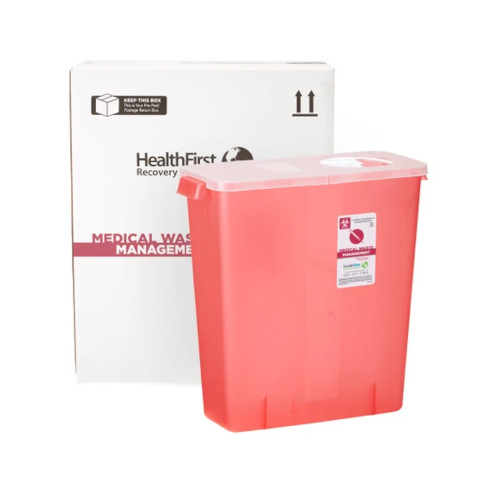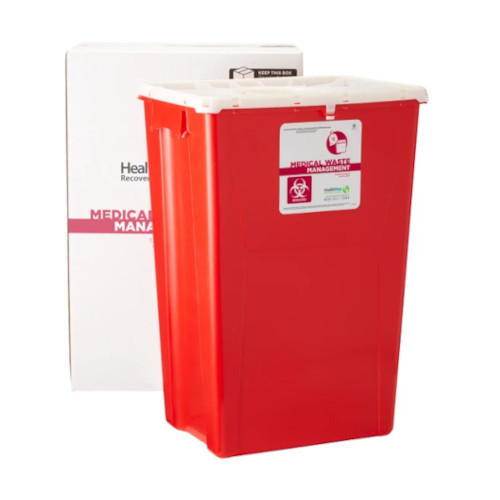Specialist Medical Waste Disposal Services: Taking Care Of Biohazards
Specialist Medical Waste Disposal Services: Taking Care Of Biohazards
Blog Article
Responsible Solutions: Recognizing Medical Waste Disposal Services
In the realm of medical care, the correct disposal of medical waste is an essential facet that requires careful consideration. As medical care centers produce various kinds of waste that call for customized handling, understanding the nuances of medical waste disposal services is critical.
Relevance of Proper Medical Waste Disposal
Appropriate medical waste disposal is vital in preserving a sanitary and risk-free atmosphere within medical care facilities. In healthcare settings, numerous types of waste are generated daily, consisting of infectious products, sharps, expired drugs, and chemical substances.

Kinds Of Clinical Waste
Within healthcare facilities, a varied variety of waste materials categorized as medical waste is generated, each calling for details handling and disposal approaches. Pathological waste, which consists of tissues, body organs, and body components, requires appropriate disposal to respect the dignity of the dead and prevent any type of biohazards. Recognizing the various kinds of medical waste is important for health care centers to carry out efficient waste monitoring strategies and protect public health and wellness and the setting.
Laws and Compliance
Medical care facilities should follow rigid laws pertaining to the handling and disposal of medical waste to make sure conformity with legal requirements and safeguard public health and wellness. These laws are established to prevent the spread of infections, secure the environment, and preserve the safety and security of healthcare workers and the public. Different regulatory bodies, such as the Epa (EPA), the Occupational Safety And Security and Wellness Management (OSHA), and the Division of Transportation (DOT), have particular guidelines that healthcare centers must follow.
To abide by these regulations, medical care facilities need to appropriately set apart, shop, transportation, and dispose of various kinds of clinical waste. This includes sharps waste, contagious waste, contaminated materials, and pharmaceutical waste, each requiring particular managing procedures. Facilities should additionally keep accurate records of waste generation and disposal to show compliance during evaluations.
Non-compliance with clinical waste policies can result in serious penalties, fines, and damages to the center's track record. For that reason, it is important for medical care centers to remain notified concerning the most recent regulations and implement durable conformity steps to protect public health and wellness and the setting.
Advantages of Expert Disposal Services
Involving specialist medical discover here waste disposal solutions offers health care facilities a dependable and reliable solution for handling dangerous materials. These services use experienced specialists that are skilled in handling different types of clinical waste, making sure correct segregation, transportation, packaging, and disposal. Medical Waste Disposal Services.
Moreover, expert disposal solutions make use of cutting edge tools and follow industry best techniques to minimize environmental effect and minimize the risk of contamination. This not only promotes a more secure job setting for healthcare staff but likewise adds to overall public health and wellness and safety and security. Furthermore, contracting out clinical waste i loved this disposal can result in set you back financial savings in the lengthy run by eliminating the demand for in-house monitoring and disposal systems.
Lasting Practices in Health Care

One key sustainable practice in medical care is waste reduction. By implementing strategies to reduce unnecessary product packaging, single-use items, and total waste generation, healthcare facilities can substantially reduce the amount of waste sent out to garbage dumps or incineration. In addition, recycling programs for materials like plastic, glass, and paper can additionally reduce the environmental influence of medical care operations.

Final Thought
To conclude, appropriate medical garbage disposal is crucial in keeping click now a secure and healthy and balanced environment for both healthcare employees and the public. Understanding the various kinds of medical waste, following guidelines and conformity requirements, and making use of professional disposal solutions are important actions in liable waste management. By adopting lasting methods in medical care facilities, we can lower environmental influence and ensure the well-being of all people associated with the medical care sector.
As health care centers produce various types of waste that call for specific handling, comprehending the nuances of clinical waste disposal services is extremely important.Within health care centers, a varied variety of waste materials categorized as clinical waste is generated, each needing specific handling and disposal approaches. Recognizing the different types of medical waste is essential for health care centers to implement efficient waste administration approaches and safeguard public wellness and the environment.
By implementing strategies to reduce unnecessary product packaging, single-use products, and overall waste generation, health care centers can dramatically reduce the amount of waste sent out to landfills or incineration. Comprehending the various kinds of medical waste, following guidelines and compliance criteria, and utilizing expert disposal services are crucial steps in responsible waste monitoring.
Report this page